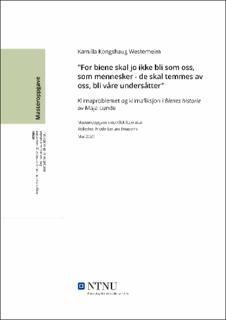| dc.contributor.advisor | Boasson, Frode Lerum | |
| dc.contributor.author | Westerheim, Kamilla Kongshaug | |
| dc.date.accessioned | 2021-09-24T18:35:15Z | |
| dc.date.available | 2021-09-24T18:35:15Z | |
| dc.date.issued | 2021 | |
| dc.identifier | no.ntnu:inspera:77752186:14963616 | |
| dc.identifier.uri | https://hdl.handle.net/11250/2781958 | |
| dc.description.abstract | Denne masteroppgaven er en analyse av romanen Bienes historie (2015) skrevet av Maja Lunde. Jeg vil undersøke hvordan Lunde fremstiller klimaproblemet gjennom en utvidet økokritisk lesing. Oppgaven vil presentere en tredelt analyse; hvordan klimaproblemet blir fremstilt gjennom biene, hvordan bikuben knytter de tre ulike tidsplanene i romanen sammen og hvordan kunnskapen fremmes som en løsning på klimakrisen. Oppgaven vil i tillegg reflektere rundt begrepet klimafiksjon og hvordan man kan se romanen i lys av dette. Oppgaven inkluderer en diskusjon rundt forholdet mellom økokritikk og klimafiksjon, som konkluderer med at vi trenger et utvidet økokritisk blikk for å kunne analysere det vi regner som klimafiksjonelle tekster. Analysen av romanen avdekker at denne har et metanivå hvor den viser litteraturens effekt og kommenterer på denne. Til slutt argumenterer jeg for en oppjustering av romanen fra å være definert som underholdningslitteratur til at vi ser den i en større kontekst hvor den utfordrer våre verdier og tenkemåter. Dette gjøres på bakgrunn av funn i analysen og diskusjon av romanen som klimafiksjon. | |
| dc.description.abstract | This thesis is an analysis of the novel “The history of the Bees”, written by Maja Lunde. My objective is to analyse how she is presenting the climate problem through an extended, ecocritical reading. The thesis will cover three different parts in its analysis. The first is how the climate problems are presented through the bees. The second is how the beehive links the three different time schedules in the novel and finally how knowledge is presented as a solution of the climate crisis. The thesis will also present some reflections concerning the term “climate fiction” and how one could possibly read the novel in spite of this. The thesis includes a discussion concerning a possible relation between ecocriticism and climate fiction. One conclusion is that we need an extended ecocritical view to be able to analyse what is named “climate fictional texts.” The thesis’ analysis of the novel presents a meta level in the novel showing the effects of the literature, and also commenting it. Finally, the thesis will make a proposition to change the perception of the novel by ms. Lunde from not being only defined as entertainment literature. It should be viewed in a larger context where it challenges traditional values and ways of thinking. This is based on what I find in my analysis and discussion of the novel as climate fiction. | |
| dc.language | nob | |
| dc.publisher | NTNU | |
| dc.title | "For bienes skal jo ikke bli som oss, som mennesker - de skal temmes av oss, bli våre undersåtter" | |
| dc.type | Master thesis | |
